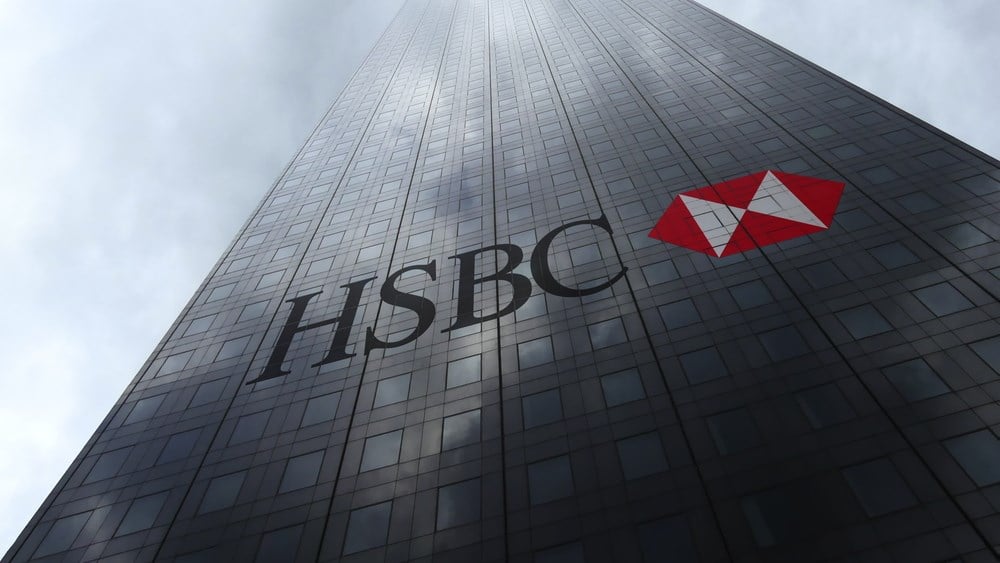
Europe’s largest bank fell along with the broader global market on August 2, despite reporting strong year-over-year revenue and earnings growth the day before.
HSBC Holdings plc (NYSE: HSBC) reported a second-quarter profit of $1.70 a share, up 26% from the year-earlier quarter.
Revenue was 36% higher, at $16.7 billion. As is the case throughout the banking industry, higher interest rates versus a year ago contributed to HSBC’s strong revenue growth.
The stock rallied to its best levels since 2019 on August 1, but tumbled the following day as ratings agency Fitch downgraded U.S. debt, sending stocks lower worldwide.
Investors Cheer Higher Net Interest Margin
One factor driving HSBC’s results was a net interest margin (NIM) increase to 1.72%.
Net interest margin is a crucial financial metric used by banks to assess their profitability. It represents the difference between the interest earned on loans, investments, and other interest-earning assets, and the interest paid on deposits and other interest-bearing liabilities.
A higher NIM indicates that a bank is earning more from its assets than it's paying out on liabilities. That leads to increased earnings and improved financial stability.
In the earnings release, the company said, “Given the current market consensus for global central bank rates, we have raised our 2023 full-year guidance for net interest income to above $35 billion.”
Lower Operating Expenses Contribute To Earnings Growth
Operating expenses fell by $0.1 billion, driven by lower restructuring and other related costs following the completion of a cost-cutting program at the end of 2022, and the reversal of historical asset impairments.
A reversal of asset impairment occurs when a company reevaluates its previously impaired assets and determines that their value has increased.
The expense reduction was partly offset by factors that are familiar at companies in various industries: severance costs, higher spending on technology, and the effects of rising inflation.
Bank Updates '23 & '24 Guidance
In media interviews, bank CEO Noel Quinn said strong capital generation led HSBC to update its guidance for 2023 and 2024. It now expects mid-teens returns in both those years, up from previous guidance of 12%.
In the earnings release, Quinn said the company is returning more capital to shareholders with a second-interim dividend of 10 cents per share. The term “second interim” in British stock reporting refers to a company's financial report covering the period up to the end of the third quarter, providing investors with mid-year updates.
HSBC is also repurchasing an additional $2 billion in shares, saying it expects “substantial further distribution capacity” ahead.
In an interview with CNBC, Quinn clarified that the $2 billion share buyback program should be completed within the next three months. The bank completed its first-quarter buyback program in the past three months.
Restoring Dividend Payout Ratios To Pre-Pandemic Levels
He added that he expects HSBC’s dividend payout ratios will be restored to pre-pandemic levels by the end of this year. It eliminated its dividend in 2020, but restored it the following year, with payout rates rising since then.
MarketBeat’s HSBC dividend data show the yield to be 5.12%, with the payout ratio currently 37.28%. Quinn said the bank is aiming to reach a 50% payout ratio.
The consensus view on HSBC is “moderate buy,” according to MarketBeat’s HSBC analyst ratings.
HSBC is part of the industry group comprised of large banks. Within that sub-industry of financial services, HSBC is the fourth-largest, by market capitalization, trailing JPMorgan Chase & Co. (NYSE: JPM), Bank of America (NYSE: BAC) and Wells Fargo & Co. (NYSE: WFC).
Europe's Largest Bank By Assets
An assets total of nearly $3 trillion puts HSBC as Europe’s largest bank, although the company, which was founded in Hong Kong and Shanghai in the mid-1800s, still has a significant focus on Asia. HSBC has a strong presence in several Asian countries and considers Asia as a key market for its operations and growth strategy.
If you own any large-cap international funds, it’s very likely that HSBC is part of that. The stock could also provide international diversification in a portfolio that’s mostly U.S.-centered.
The HSBC chart shows the stock finding support at its 21-day moving average after the pullback in the prior session. That support could offer a buy opportunity for more aggressive investors who don’t want to wait until the stock surpasses its previous high of $42.47.














